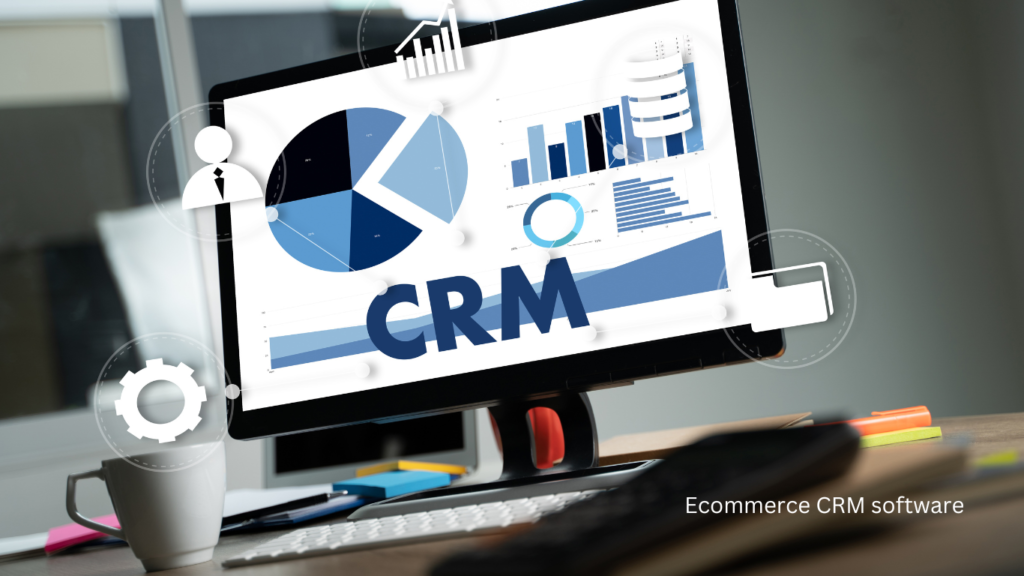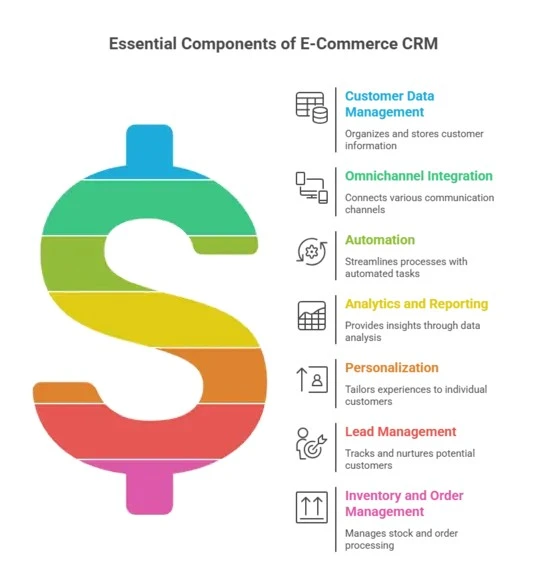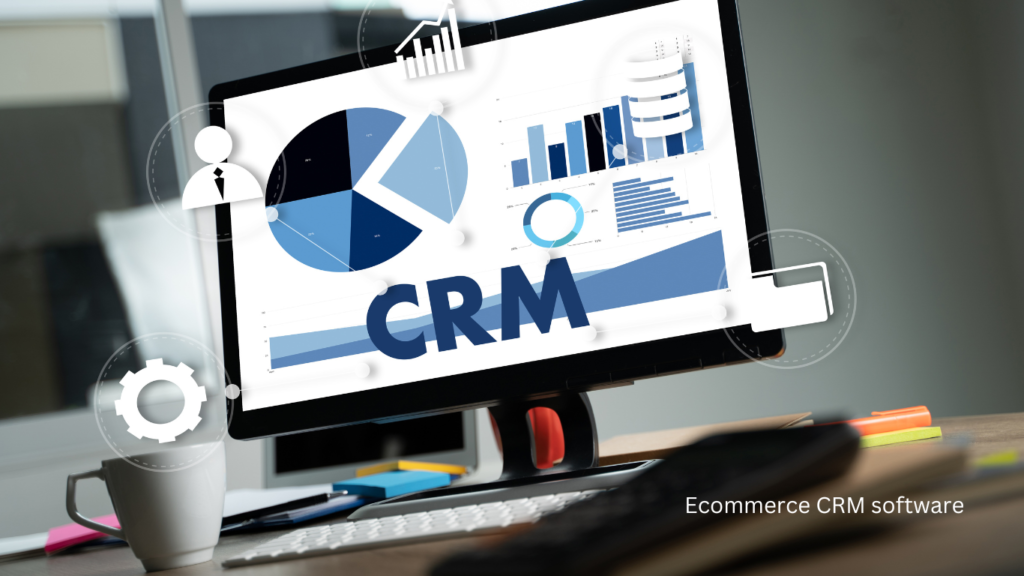If you are an e-commerce vendor, you know how important it is to track customer data. Your customers are the bloodline of your business, and monitoring their behavior will help you create personalized marketing strategies. That’s where eCommerce CRM software comes in. With the right tool, you can analyse customer data, automate repetitive tasks and predict shopping patterns. Let’s understand the best CRM platforms and discuss how to choose the right one for your business.

What is E-commerce CRM Software?
A customer relationship management system helps companies create a single dashboard to track critical data. For eCommerce businesses, a CRM manages communication to boost sales through better customer experiences.
eCommerce CRM software differs from traditional CRM systems because it is specifically tailored to address the needs of online stores. It focuses on online sales funnels, customer behaviour tracking, inventory management, and email marketing automation, making it essential for eCommerce businesses in 2024.
Core Features of E-Commerce CRM Software

While each CRM solution offers unique functionalities, some core features are necessary for the effective management of an eCommerce business. Here are the essential features you should expect from the best crm software for ecommerce in 2024:
1) Customer Data Management
Ecommerce CRM platforms collect, store, and manage customer data. The software centralises customer information, including contact details, purchase history, and interaction logs, providing a comprehensive view of each customer.
2) Omnichannel Integration
A robust CRM for eCommerce integrates with multiple sales channels like websites, mobile apps, social media, and marketplaces (Amazon, eBay, etc.). Omnichannel integration ensures that you can track customer interactions across platforms and deliver a consistent experience.
3) Automation
Automation in eCommerce CRM software helps streamline operations such as email marketing, customer follow-ups, and abandoned cart recovery. With the right CRM, you can set up automatic workflows that trigger personalised emails or notifications based on customer behaviour.
4) Analytics and Reporting
Data-driven decisions are critical in 2024. CRM solutions come equipped with detailed analytics that track customer behaviour, sales performance, and marketing ROI. The ability to generate customised reports allows businesses to understand their strengths and areas of improvement.
5) Personalization
Modern customers expect tailored experiences. E-commerce CRM software enables you to personalise communication and offers based on customer preferences and purchase history, improving customer retention and satisfaction.
6) Lead Management
Managing leads effectively can make a significant difference in conversion rates. CRM software helps identify and nurture potential customers by tracking their activities and providing timely, relevant content to guide them through the buying journey.
7) Inventory and Order Management
Some CRMs also offer inventory and order management features. This functionality helps businesses maintain real-time updates on product availability, streamline order fulfilment, and avoid overselling or stockouts.
Top eCommerce CRM Software
Now that we’ve covered the essential features, let’s explore some of the best CRM software for e-commerce tools available in 2024. These solutions are designed to cater to businesses of all sizes and offer unique capabilities that can boost your marketing strategy.
1. HubSpot CRM
HubSpot is one of the best CRM for ecommerce industry analysis. It offers a free tool with paid upgrades for additional features. HubSpot integrates seamlessly with popular eCommerce platforms like Shopify and WooCommerce, making it ideal for online stores. Key features include customer segmentation, sales automation, and comprehensive reporting.
Benefits:
- Free basic version
- Excellent integration with eCommerce platforms
- Automation and personalization features
2. Salesforce Commerce Cloud
Salesforce is a heavyweight in the CRM industry, and its Commerce Cloud solution is a powerhouse for eCommerce businesses. This excels in providing a 360-degree view of customer data, AI-powered personalisation, and advanced analytics. It is ideal for larger enterprises with complex needs.
Benefits:
- AI-driven insights and automation
- Omnichannel support
- Extensive third-party integrations
3. Zoho CRM
Zoho CRM is the best ecommerce CRM software, popular among small to medium-sized businesses for its affordability and robust features. It provides eCommerce integrations with platforms like Shopify and Magento. Zoho’s automation features allow businesses to set up workflows that enhance customer engagement and boost sales.
Benefits:
- Cost-effective for smaller businesses
- Strong marketing automation tools
- Customisable dashboards
4. Klaviyo
Klaviyo is known for its email marketing capabilities but has expanded into a full-fledged eCommerce CRM software solution. It is especially effective for stores looking to improve their marketing automation and customer segmentation. Klaviyo excels in providing targeted marketing strategies based on customer data.
Benefits:
- Excellent email marketing and automation tools
- Advanced customer segmentation
- Integration with major eCommerce platforms
5. ActiveCampaign
ActiveCampaign provides an all-in-one solution combining email marketing, automation, and CRM functionalities. It is designed for businesses looking to nurture leads and build lasting customer relationships. The platform offers robust tools for managing contacts, creating automated workflows, and tracking customer behaviour across channels.
Benefits:
- Comprehensive automation features
- Easy-to-use interface
- Strong customer support
Ecommerce integration software
The business development in the digital marketplace of the present era heavily relies on smooth operations, and this is, in fact, what the eCommerce integration software offers to you: it takes into consideration your online shop and bridges it to important business systems like ERP, CRM, or inventory management to keep the data up to date and to make the orders processed.
It will make processes and manual errors automatic, minimizing the number of errors, saving time, and enhancing customer satisfaction. Using good eCommerce integration software, businesses will be able to have a unified perspective on the business, to automate the delivery process, and to make more informed and data-driven decisions. It is a key to efficient expansion, reduction of costs and competition in the ever-evolving world of online shopping.
Benefits of Using eCommerce CRM Software
The right eCommerce CRM software can transform your business. Here are the primary benefits of crm software you can expect:
Increased Sales:
Businesses gain access to detailed customer data to help them make informed decisions, such as cross-selling and upselling to existing customers. This drives revenue growth and improves the overall customer experience.
Streamlined Marketing Efforts:
Benefits of CRM software is targeted marketing campaigns. By segmenting customers based on their behavior, businesses can send personalized promotions that are more likely to convert, increasing the efficiency of marketing efforts.
Better Customer Support:
A CRM provides a centralised platform for managing customer queries, complaints, and feedback. This enables your support team to respond promptly and resolve issues efficiently, leading to better customer satisfaction.
Enhanced Decision-Making:
The analytics and reporting features in eCommerce CRM software give businesses valuable insights into customer behavior and sales trends. This data allows businesses to optimize their strategies and make informed decisions.
Automation of Repetitive Tasks:
Automation is a key feature of modern CRM systems. It allows businesses to automate time-consuming tasks like follow-up emails, customer notifications, and order updates, freeing up time for more strategic activities.
Choosing the Right eCommerce CRM Software
When selecting an eCommerce CRM software, consider your business size, specific needs, and budget. For smaller businesses, solutions like Zoho CRM or HubSpot may be sufficient, while larger enterprises might benefit from the extensive features offered by Salesforce Commerce Cloud.
Make sure to assess the software’s ease of use, integration capabilities with your current eCommerce platform, and the level of customer support provided. By choosing the right CRM, you’ll be able to maximise the efficiency of your sales and marketing efforts, leading to growth and improved customer satisfaction.
Conclusion
Implementing an eCommerce CRM software can be a game-changer for your business. It improves user experience and eliminates supply chain bottlenecks, helping you personalise your customer’s shopping experience. For further insights on eCommerce trends, contact Qodenext today.
FAQs: Top eCommerce CRM Software
1. What is the primary difference between eCommerce CRM software and traditional CRM software?
The primary difference lies in the functionality tailored for online businesses. eCommerce CRM software is designed to meet the specific needs of digital retail, such as tracking customer behaviour across online platforms, managing inventory, and automating marketing efforts like cart recovery emails. Traditional CRM focuses on general sales, customer service, and B2B communication.
2. How does eCommerce CRM software help improve customer retention?
E-commerce CRM software improves customer retention by storing detailed customer profiles, which include interaction history, purchase patterns, and preferences. This data enables businesses to create personalised marketing campaigns, offer targeted product recommendations, and send timely follow-ups, all of which contribute to better engagement and long-term loyalty.
3. Can eCommerce CRM software integrate with multiple sales channels?
Yes, most top eCommerce CRM software options in 2024 support omnichannel integration. This means they can sync data from various channels, such as your website, social media, marketplaces (e.g., Amazon, eBay), and brick-and-mortar stores. This feature ensures seamless customer experiences regardless of the sales channel.
4. Is eCommerce CRM software suitable for small businesses or startups?
Absolutely! Many eCommerce CRM software solutions cater to small businesses with flexible pricing plans and scalable features. Tools like Zoho CRM and HubSpot are particularly popular among smaller enterprises due to their affordability and ease of use, offering everything from customer segmentation to automation workflows.
5. How does eCommerce CRM software help with marketing automation?
E-commerce CRM software provides tools to automate various marketing tasks, such as sending personalised emails, triggering customer re-engagement campaigns, and delivering product recommendations. For example, you can automatically send a cart abandonment email when a customer leaves items in their cart or set up post-purchase follow-up emails to encourage reviews or repeat purchases.







